H’Mong King Palace, also known as King Meo Palace(Dinh Vua Meo) or Vuong Family Palace, is one of the famous destinations that many young enthusiasts love to visit. It is one of the constructions built since the late 19th century, featuring unique architectural elements intertwined with mysterious stories surrounding the Vương family. To learn more about this fascinating tourist spot and for detailed information, please follow the article below from DanangPrivateCar.com’s.
Table of Contents
Introduction to H’Mong King Palace (King Meo’s Palace)
Where is H’Mong King Palace Located?
H’Mong King Palace, belonging to the Vuong family, is situated in the Sa Phin commune, Dong Van district, Ha Giang province. This location is one of the most prominent tourist destinations that vividly reflects the life of King Meo Vuong Chinh Đức. According to historical records, the Vương family palace was built in 1919. The palace was constructed on the rocky plateau of the H’Mong people, who revered King Meo as their ruler. It governed a vast area encompassing four major districts in Hà Giang: Quan Ba, Yen Minh, Dong Van, and Meo Vac.
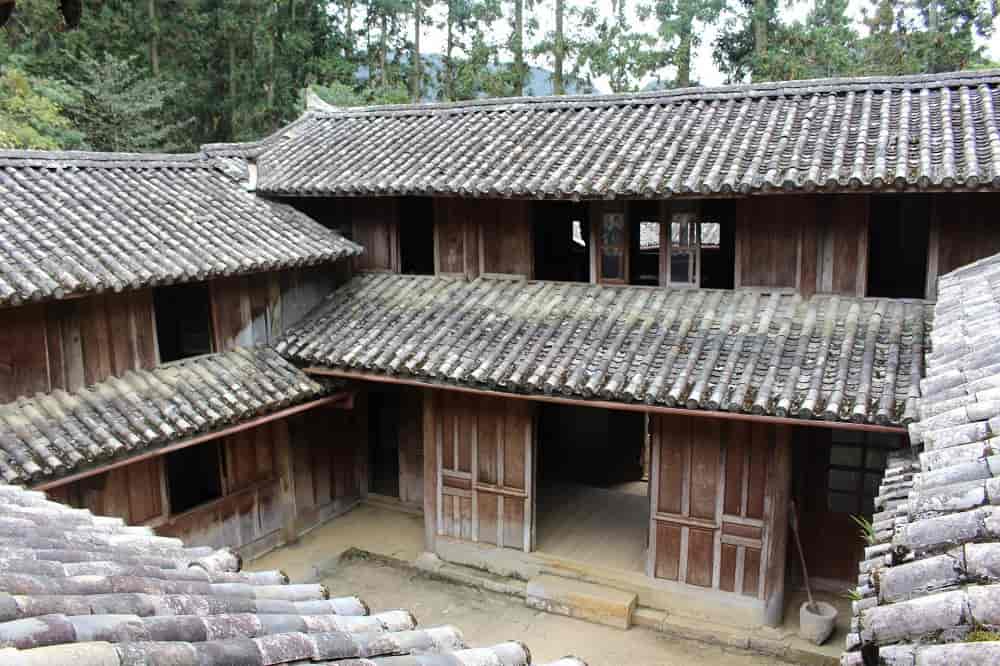
H’Mong King Palace is nestled in the Sà Phìn valley, Lủng Phìn commune, approximately 125 km away from Hà Giang city center and about 15 km from the renowned Đồng Văn plateau. This historic house is closely linked to the lives and careers of King Mèo Vương Chính Đức and King Vương Chí Sình, the H’Mong leaders.
History of H’Mong King Palace Construction
The construction of the palace commenced in 1898 and was officially completed after nine years of work, with a cost of 15,000 Indochinese piastres, which today would be equivalent to 150 billion Vietnamese Dong. The palace was designed and built by a craftsman from Yunnan, China, with the assistance of the local H’Mong people. Together, they created a stunning and captivating landscape in Ha Giang.
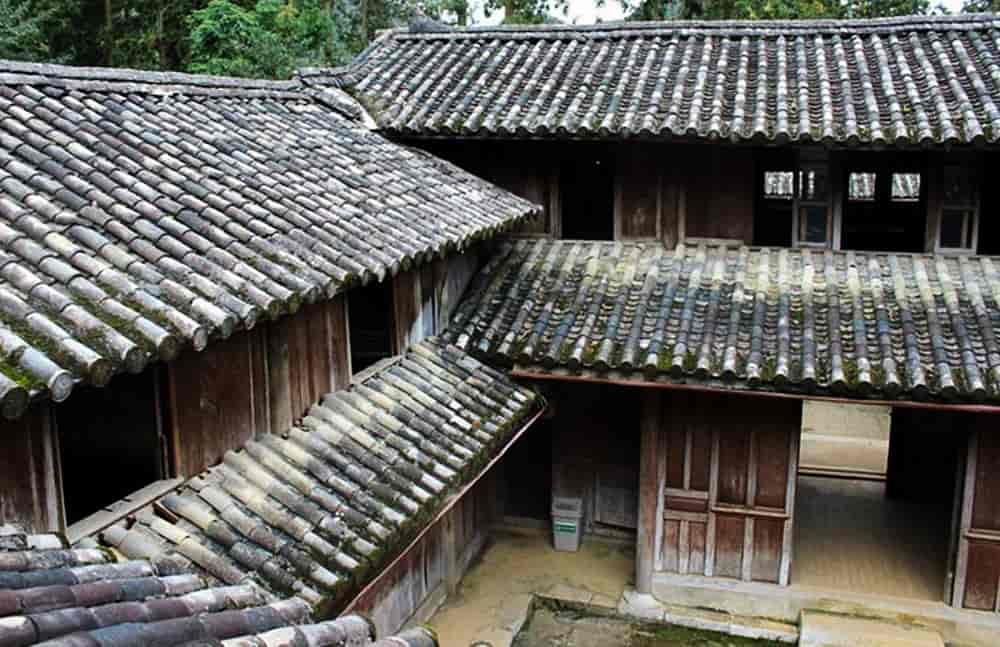
This palace is strategically located on a piece of land shaped like a turtle shell, surrounded by majestic rocky mountains. This setting ensured both feng shui and structural stability. As visitors enter the palace area, they are greeted by tall, straight poplar trees. At the entrance gate, there is a finely carved stone platform.
The palace boasts a spacious design, covering an area of approximately 1,200 square meters within a total area of around 3,000 square meters. Thanks to its rich history and cultural significance, H’Mong King Palace was designated as a national relic by the Ministry of Culture, Sports, and Tourism in 1993, after nearly a century of existence. Furthermore, it took five years to commence its construction and restoration.
Directions to H’Mong King Palace
If you’re traveling from Hanoi to Ha Giang, you can take the route Hanoi – Vinh Phuc – Viet Tri – Phu Tho – Tuyen Quang – Ha Giang. This is one of the routes that many young travelers choose when visiting Hà Giang.
Alternatively, you can opt for public transportation to get to Ha Giang. From Hanoi, you can go to the My Đinh bus station, and from there, you can take a bus to the city center of Ha Giang. Typically, the ticket price for this bus ride ranges from 250,000 to 300,000 Vietnamese Đồng for a one-way journey. From the city center of Ha Giang, you can continue your journey to Vương Family Palace.
If going to the bus station and dealing with public transportation schedules, delays, and potential price haggling is not your preference, you have a better option: renting a private car with a driver in Hanoi from DanangPrivateCar.com. With our private car service, the driver will pick you up directly from your hotel lobby, the airport, train station, or any other location in Hanoi. Moreover, during your journey to Hà Giang, you can take breaks or visit famous tourist spots that public transportation can’t provide. Book your private car journey from Hanoi to Ha Giang today to arrange your schedule.
To reach H’Mong King Palace, you’ll need to travel by motorcycle. Ha Giang offers many high-quality motorcycle rental locations for you to choose from.
The H’Mong King Palace is located in the Dong Van rocky plateau. To get here, you can follow the route from the city center of Hà Giang – visit the tourist destination Heaven’s Gate Quản Bạ – the Yên Minh pine forest, and the next stop is the H’Mong King Palace.
Along the way, you can easily admire the entire landscape and the scenery here. You can also visit the attractive tourist spots as mentioned, along with the wonderful natural beauty that Mother Nature has bestowed upon you.
Explore the Ancient Beauty of King Meo Palace
Unique Architectural Fort in the Mountains
Vương Family Palace is situated in a valley surrounded by highland mountains, with its distinctive turtle-shell-like terrain providing excellent defensive support during times of war.
The architecture inside the palace is exceptionally unique and innovative, showcasing the exquisite fusion of three different cultures: the H’Mong people, the French, and the Chinese. The structure consists of four horizontal and six vertical houses, divided into three main areas: the front, middle, and rear palaces, serving various functions along with 64 small chambers on two floors. To ensure sturdiness, the walls and columns are made from wood, adding a touch of solemnity and grace to the rooms.
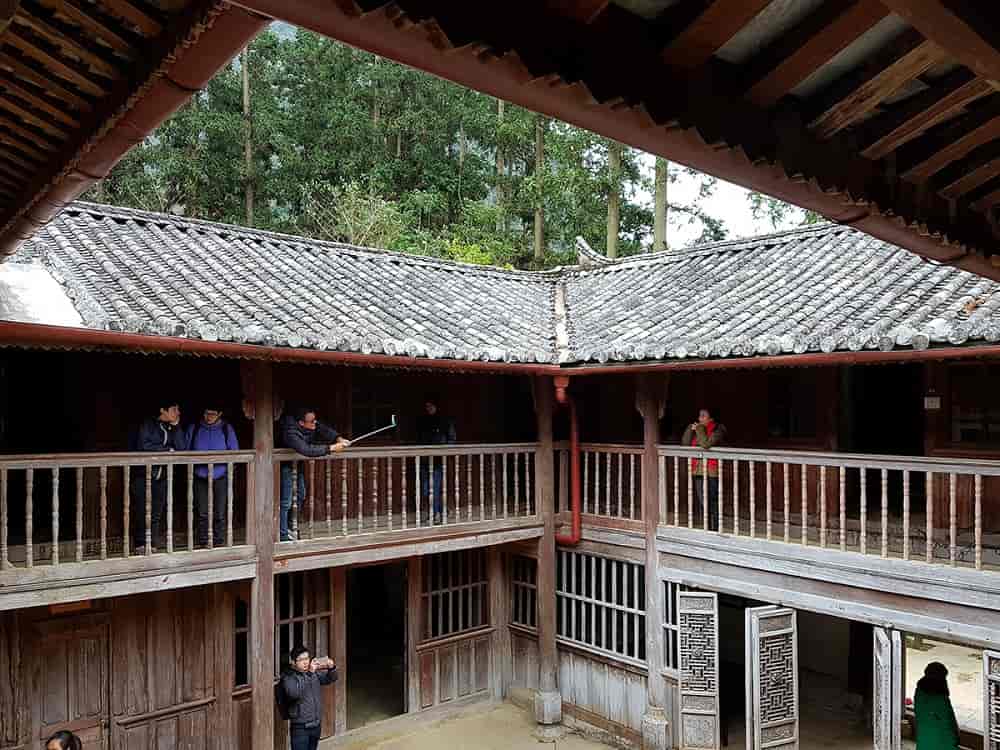
Another material used is clay for constructing the tiled roof sections, making them easier to shape while retaining their distinctiveness.
The palace harmoniously combines these three diverse cultures, offering a unified and elegant appearance. Despite its large land area of 3000 square meters, the palace is not as massive as one might imagine, bearing a wonderfully simple and rustic cultural and architectural charm. The design presents an overall beauty with a folk cultural architectural style, featuring designs with the image of dragons and the natural beauty of the area.
Vương Family Palace is a well-known tourist spot, and most of the interior items are associated with King Mèo’s life when he was alive. All these artifacts are well-preserved until today, except for some wooden tables and chairs made from rosewood that have deteriorated over time.
The wooden components strongly reflect the local cultural heritage. The intricate carvings on the stone doors and windows and the remarkable use of granite create a distinctive and captivating French architectural atmosphere.
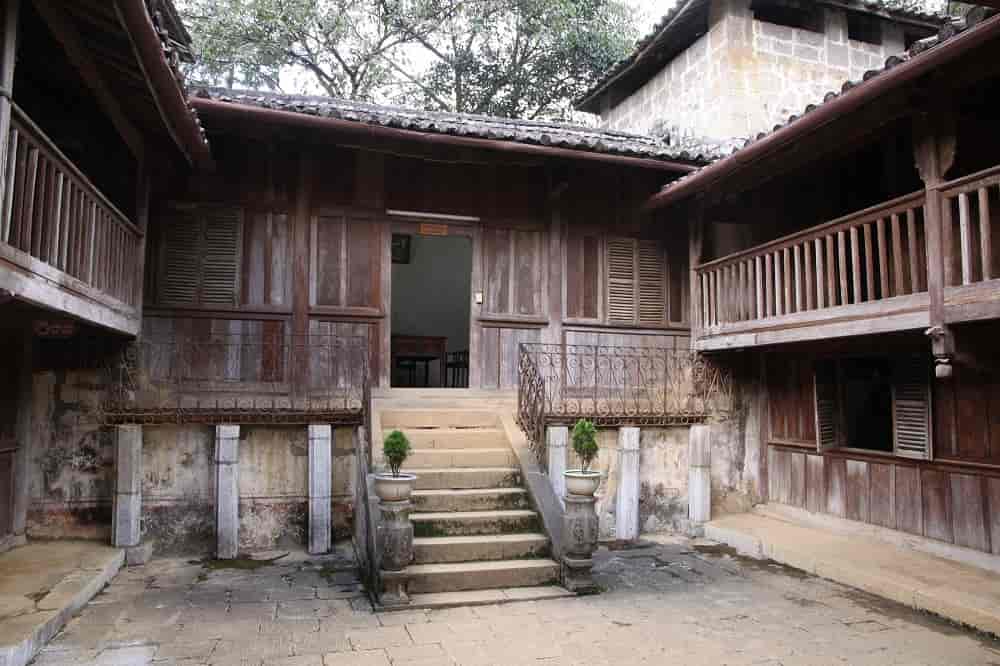
Upon entering the palace area, the first impression you will have is the tall, straight poplar trees that are hundreds of years old. The stone gate of the palace, with its exquisitely carved lines, stands proudly and majestically. The house gate with its curved tiled roof and twisting designs resembles the wings of butterflies. The wooden gate is intricately and elegantly carved.
The palace takes inspiration from the Qing Dynasty’s Chinese Quách architecture, combined with H’Mong and some French architectural elements, creating a unique and distinctive beauty when you set foot here.
Another special highlight of the palace is the art of stone carvings within these house rows, marked with the Vương family’s opulence and fortune. The intricately carved stone slabs exhibit extraordinarily beautiful symbols of prosperity.
Over more than a century of changes, the palace still maintains a unique and attractive beauty. Here, you can admire this beauty from anywhere you like.
A Favorite Check-In Spot for Many Young People
When you visit this place, you’ll not only witness the unique architecture and King Mèo’s belongings but also explore a fascinating tourist destination.
This is an incredibly interesting place to stop by and check-in at various scenic spots and architectural marvels. Dress up in attractive outfits with various colors to capture beautiful photos during your visit!
The Legend of Vuong Family Palace
The preserved and eye-catching architecture of the Meo King’s Palace is surrounded by fascinating stories that have been passed down over the years.
According to the tale, this was the first residence of King Mèo, Vương Đức Chính, situated at the foothills near a large mountain pass, chosen based on the Feng Shui advice from the Vương family. They sought an expert in astrology and geography to help them quickly locate an auspicious location. They even sent emissaries to China to invite Trương Chiếu, a renowned Feng Shui master, to evaluate the land before constructing the palace. After careful consideration, the master selected Sà Phìn as the site for King Mèo to build his palace.
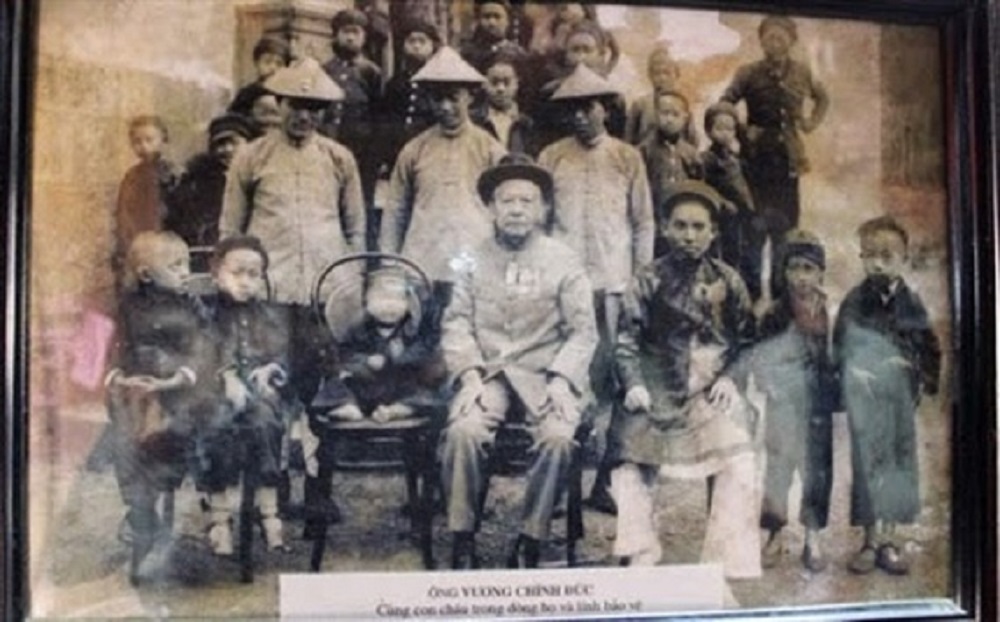
Another mysterious legend related to King Meo, Vương Chính Sình, involves a curse placed on the Vương family by a Han Chinese Feng Shui master. The curse almost led to the extinction of the family line. King Mèo, during his lifetime, suffered from a back ailment and was treated by several physicians, along with the use of precious herbs, but to no avail. A Han Chinese master suggested that their ancestors’ grave was in a sacred land of heaven and earth, located on the back of a dragon. Consequently, King Mèo moved the grave to another location, suspecting foul play by someone else. Due to violating certain taboos, his first three wives couldn’t bear children, and only his fourth wife was able to give birth to a son.
Some Tips When Visiting King Meo Palace
The road to King Meo Palace involves various types of terrain, with steep slopes, sharp curves, and potentially dangerous stretches. If you plan to visit on a motorbike, make sure it’s well-maintained before your trip.
Additionally, it’s advisable to bring extra layers of clothing to keep warm since the highlands can experience sudden rainfall. Be prepared with clothing that offers both style and comfort during your journey.
Choose comfortable sports shoes for easier movement because the roads you traverse will often be difficult and rugged. It’s also a good idea to be prepared with comfortable sports shoes for your travels.
When taking photographs with the local children, always ask for their consent before doing so.
Upon arriving at Vương Family Palace, it’s essential to respect the space and its artifacts. Do not touch or tamper with the items. Seek permission from the management before interacting with them.
When visiting this historical site, maintain a respectful demeanor and refrain from speaking loudly, as it attracts numerous tourists who come here to appreciate the beautiful scenery in peace.
The above is the entire article about the Meo King’s Palace as a tourist destination. Hopefully, this article has provided you with valuable information about the palace as well as the Ha Giang travel destination.

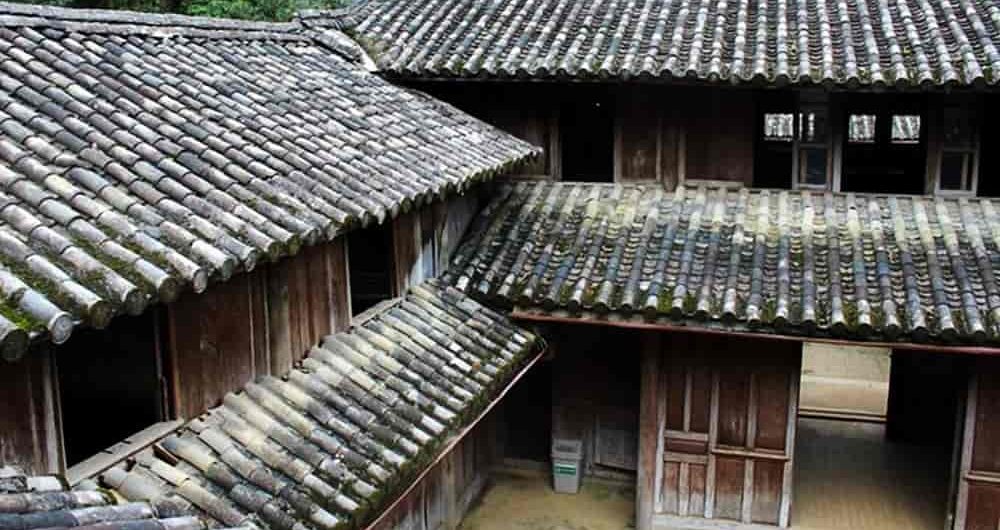
Comments